Desturi – Health and Education
Kenia-Letter | December 2016
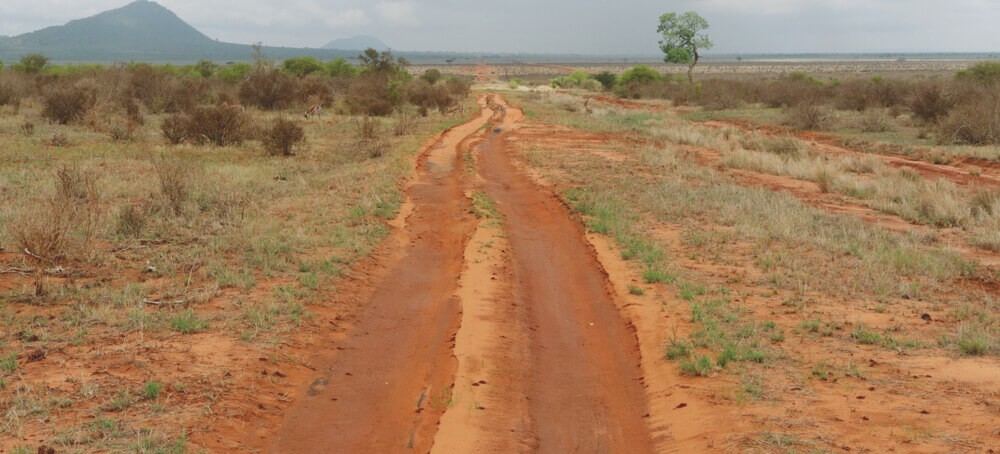
Dear friends of Desturi, karibuni rafiki!
This letter from Kenya will take a look back at the year 2016, which is coming to an end soon. Our once small seedling is growing dynamically, hopefully it will mature in sustainable way and is becoming younger and more differentiated at the same time. Desturi is now 10 years old and very much alive!
All good things come in threes: This year, Lisa Wacker and her TUM team travelled to Kenya three times to actively support the project - in April, in August and once again in late November to early December. In November Helmut Prager and Zsu-sanna Widhammer, long-awaited by the village community, spent two weeks in the bush again. They visited the village in the hottest time of the year, after it had not rained since March (!). They not only committed themselves to combat toothaches, but also got involved in the planning and design of reliable health care in the village.
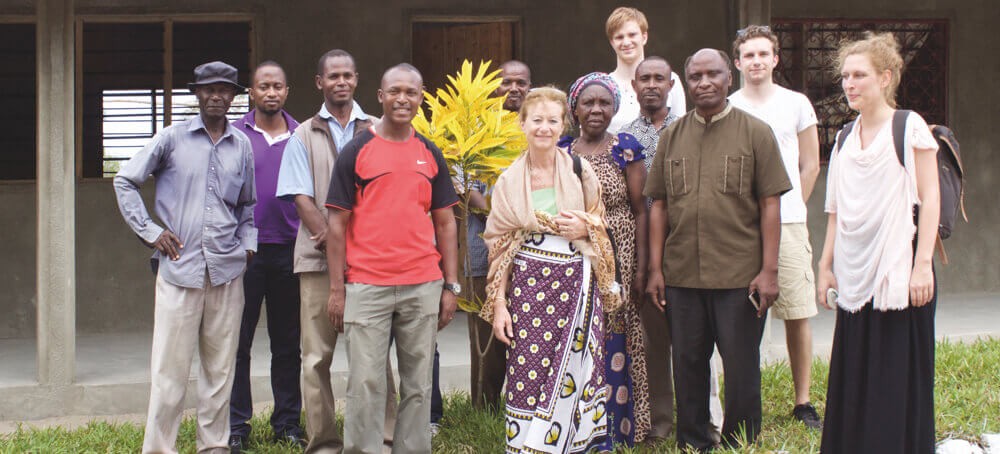
“Last year in December, we visited the Desturi project for the first time and were able to see with our own eyes how the small seedling - the Desturi Pri-mary School - has developed. We were thrilled by the fascinating African continent and the country of Kenya as well as the Desturi project in partic-ular. To see what has emerged in recent years thanks to numerous volun-teer supporters impressed us very much and motivated us to become part of the project. Health and education for the people in Kakuyuni are really needed!“
Philip and Benedict
Desturi has been rejuvenated
While Helmut and Zsusanna with their health competency are members of the „second generation“ of fans and supporters, the youth now, as „third generation“, is taking up the work. These new activists are primarily Philip Bootz, Lisa’s older son, who is an economist, and his close friend and fellow student Benedikt Schlüter, an industrial engineer. Both visited Kakuyuni in April and November and are highly motivated and dedicated to supporting Desturi from Germany.
Community
During all three of Lisa’s visits, the Foundation’s members − who were joined by the project managers − were able to meet to consult concerning the next steps, but also to thoroughly discuss and evaluate ongoing modifications and changes. This participatory approach, characteristic of successful development cooperation, gives community members the opportunity to be there, to discuss and understand why the commitment is really worthwhile.
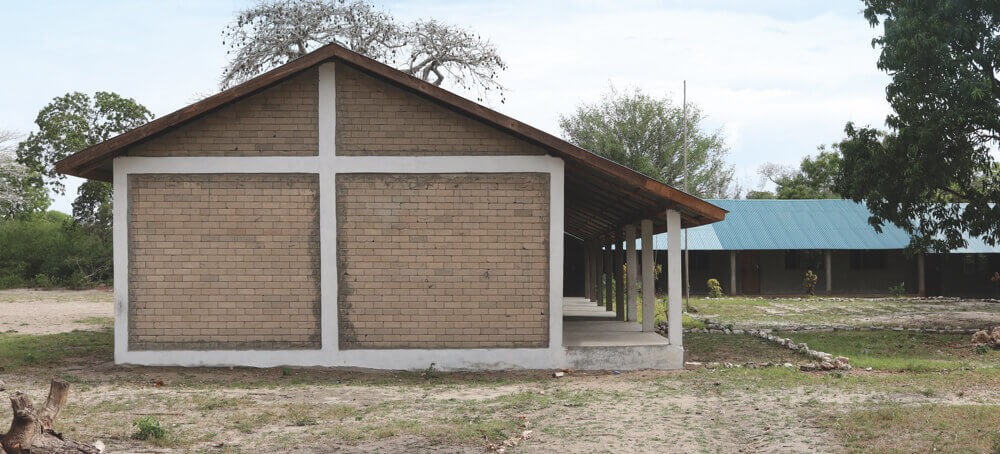
Development of the school
First of all the good news: What started in 2007 as a nursery class has since grown and flourished as the Desturi project for 10 years, thanks to the sponsorship via generous donations, in particular from the Rotary Club München-Harlaching. Looking back at recent years, it is clear that unselfish commitment by all stake-holders and every Euro which was donated have directly contributed to steady growth and progress. It has become more and more realistic to offer African children in the Kenyan bush a positive life perspective.
School and infrastructure continue to grow. We are very happy that more than 350 kindergarten and school children fill the school grounds with life every day. Their eagerness to learn and their joy, coupled with gratitude, are for us a confirmation of our commitment and motivation to continue our work.
The great success in 2015 − the official registration of the Desturi School − still makes hearts beat faster and dreams fly higher: Now the pupils are allowed to take their final examinations after the 8th grade on site. Good results are expected, since the ongoing comparative tests justify great optimism.
In 2016, the school was again extended by new facilities. In April Lisa was able to open a new classroom in the presence of Prof. Katana, who is tirelessly involved in the school project, as well as all other community actors. It also has a large black-board to allow for more complex and detailed presentations.
"What started in 2007 as a nursery class has since grown and flourished as the Desturi project for 10 years"
We were delighted to note that the bricks for the newly constructed parts of the school building now come from our own production! With the help of these new construction materials, the second side of the U-shaped school building has almost been completed. Only the plaster work is still pending, but will hopefully be finished by the end of the year.
The school now has a total of seven classrooms and two rooms for the kindergarten classes. A teachers’ room and a library, as well as an office for administration were added, since organizational tasks also expand with the school. With the successful connection to the local network, electricity and lighting are now available in the entire school building. The absolute highlight of the school is the computer class, which could be built this year thanks to Rotary funds. Teachers and pupils now have the opportunity to learn how to work with computers and software.
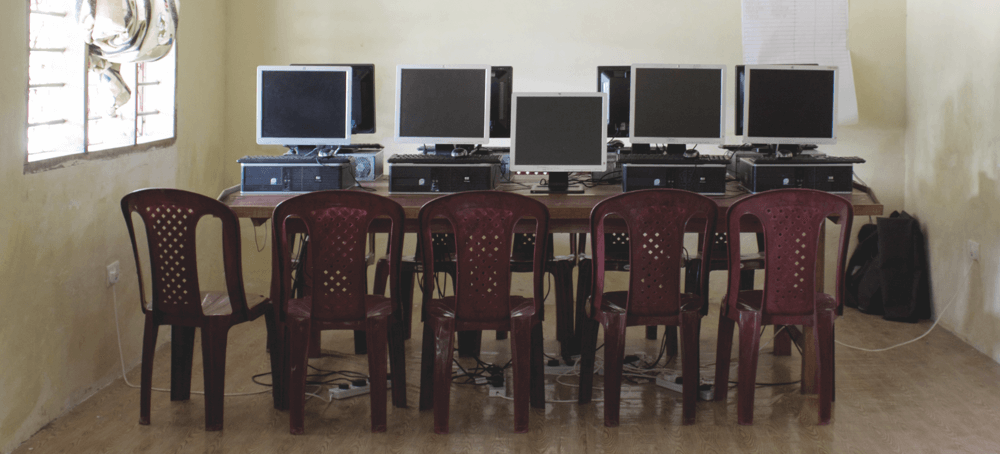
"In regional comparisons, the Desturi Primary School regularly ranks among the top three to four of over 40 schools in the region."
In order to meet the needs of the ever-increasing number of pupils and to make room for the further expansion of the school, the existing three toilets were moved. Solid new brick sanitation facilities have been built further back on the school grounds and have been equipped with an underground brick-built sewage tank. These facilities provide enough space for the children’s hygienic needs, including proper hand washing.
In 2016 a long-cherished wish of parents and teachers was fulfilled: the fencing of the school ground to protect the many children from the traffic passing along the dusty road, which is often used by safari vans taking guests from the coastal region to Tsavo National Park. The planting of bougainvillea is also planned.
Not only has the school building grown, but also the number of teaching staff. Headmaster Raymond is now supported by eight teachers and two trained early childhood educators. Their joy and enthusiasm provide a long-term perspective for the kindergarten and school childre. As mentioned, the school concept has also proved to be successful in terms of quality. In regional comparisons, the Desturi Primary School regularly ranks among the top three to four of over 40 schools in the region.
A test of a completely different quality was carried out by the Technical University of Munich: A TUM student observed the quality of instruction in the kindergarten classes for more than seven weeks. Now her master’s thesis to obtain the degree in sports science (focus: movement and health) is available. The results of her thorough work show that movement and sports units are offered daily, but their quality can be considerably increased. To this end, a teacher training program is recommended, following the idea of ‘teach the teacher’.
During Lisa’s visit in November 2016, for the first time no school lessons were held at this time of the year. The Kenyan government had drawn the line, because the upcoming final exams at the end of the school year had apparently never been adapted to the rhythm needed for a new school year to start on time. For this rea-son, two months of holidays were decreed for all pupils not taking part in a final exam. This should allow administrative and management staff to reorganize. However, the school compound is not empty: regular activities are taking place, which of course are not prohibited despite the enforced extra holidays.
Development of the non-curricular activities
The first Desturi children have now become adolescents who like to spend their free time with their peers. This is why one focus this year has been on offering social activities outside school hours. Nothing connects people better or creates more motivating group dynamics than common sporting experiences and successes. The Desturi Soccer Team was founded led by the team manager Emmanuel. A large area has been cleared and turned into a soccer field behind the school building.
"Our special thanks go to the soccer club Munich-Freimann, which donated the jerseys."
During the April visit, we were happy to hand over a set of jerseys and to watch the first game in uniform dress. Our special thanks go to the soccer club Munich-Freimann, which donated the jerseys. We are also grateful to Anke Petters, another young generation activist, a social worker, an active footballer and one of Lisa’s nieces, for her successful persuasive work with the sponsors.
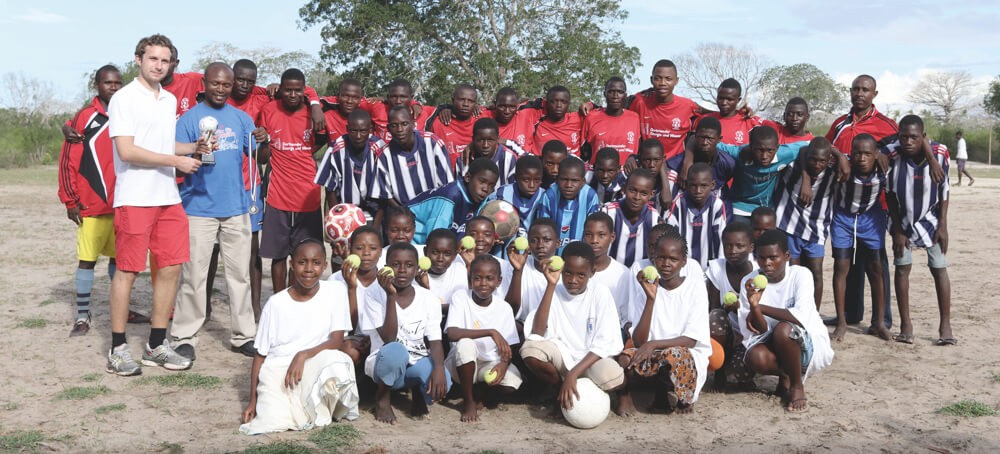
In addition she was helpful to Emmanuel in forming a girls’ soccer team. More jerseys and a complete team set are due to Philip’s and Benedikt’s circle of friends and the generosity of SC Husen-Kurl in the North-Western part of Germany. Apart from the soccer field, a lot is happening to enhance cohesion and social in-tegration amongst the pupils. Free-time activities have extended the course offer outside school hours. Based on the devoted efforts of many family members, a school choir is developing, and on the weekends Emmanuel gives the children the opportunity to begin learning German. By establishing youth groups and sports offers as an addition to the regular teaching activities at the school, the community aims to ensure long-term stability, group identity and well-being of the students, which is particularly important in times too often characterized by terror, radicalization and fanaticism. Extensive sports donations, from the BVB and the TC Eintracht Dortmund among others, were brought to Kakuyuni during the November visit. There is an urgent need for balls of any kind, as well as suitable footwear, because most children play barefoot.
Maintenance and sustainability
The floors of the early buildings, which are partly bumped up by the roots of a near-by tree, must constantly be repaired. Since after reaching the school, the electricity connection has now reached the village, we can expect a brighter and quieter future without generators. The serious water problem is, however, still unsolved. It is therefore even more important to harvest the water during the occasional, but relentlessly heavy, downpours with the help of gutters and tanks to store the precious water. During our November visit we were able to experience what ‘heavy downpours’ means in Coastal Kenya.
Administration on both sides
We are proud to report that the Desturi Primary School has developed into a well-established educational institution in Kakuyuni over the past few years. Every day children from the surrounding homesteads come to the school to participate in the educational program. At the same time, the school attracts students from a much wider area. Some children cover a distance of up to five kilometers to reach the school. However, the constant growth and the increasing number of pupils also lead to an increasing need for organization. On the school campus, this is handled by an administrative employee in the Desturi office, who works in close consultation with Emmanuel and other family members. With the accounting system (bookkeeping) set up in the last year, every Kenyan Shilling taken in and spent for the school enterprise is documented. The accounting complies with Western / European standards. With the growing management needs, the running costs of the operation of the school are also increasing. Electricity charges and teachers’ salaries must be paid, and the students should continue to have lunch. To contribute to covering the costs, a modest school fee is paid by those parents who can actually afford it. But a large percentage of the parents are unable to make this contribution. The Desturi-Foundation continues to provide support for the children of these families.
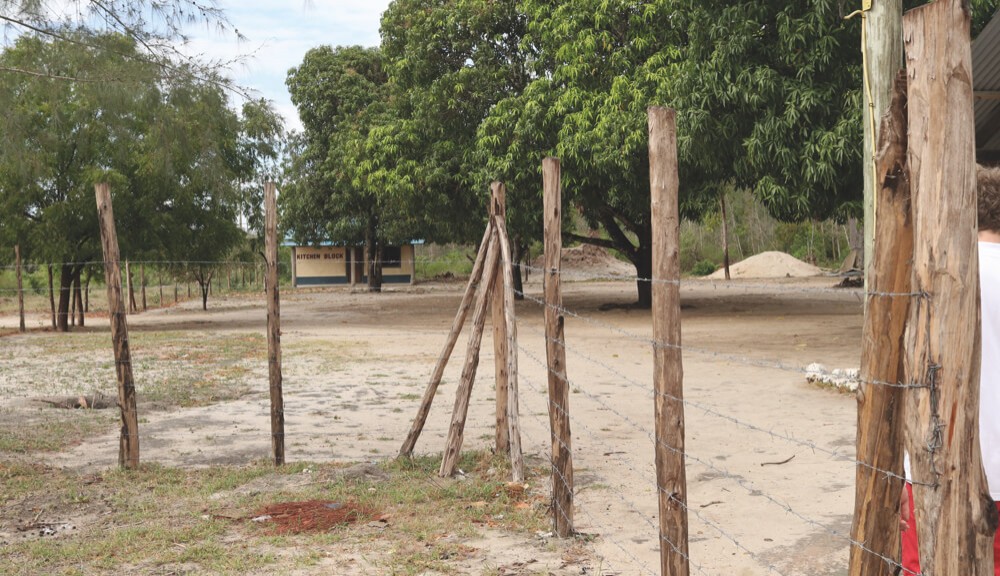
Philip and Benedikt as members of the young generation form the bridge between the financial administration in Germany and the Kenyan foundation which administers the donation funds in Kenya after Ludwig Kronthaler’s withdrawal from the Desturi project. They are in permanent contact with Günter Maenner, who is also responsible for the Rotary donations on the German side, as well as Helmut and Zsusanna, who are members of the board of directors of the association “Gesundheit und Bildung für Afrika“ (Health and Education for Africa). This ensures constant and reliable control of financial flows. At this point, we want to acknowledge Ludwig’s indefatigable commitment as a first-generation activist for Desturi.
The transparent, completely disinterested use of the donation funds is a Desturi trademark. For example, all travel activities, as well as other activities within the framework of Desturi, are financed by private means. Every donated Euro goes to Kakuyuni, where it is urgently needed. To ensure the ongoing quality control of financial accounting, a joint workshop on accounting took place during the third visit to Kenya at the end of the year. During this workshop the accountings-team looked at all the ‘dry numbers’ in a systematic way. It would be fantastic if further donations this year confirm the general high interest and commitment as well as the friendship with Desturi.
Future plans for infrastructural development
In order to help more people in the region in a sustainable way and to improve the local infrastructure, various construction measures are planned in the immediate vicinity of the Desturi area.
Rescue Center | Orphanage
The project for vulnerable children without parents or guardians in the region, which was already mentioned in the last Kenya letter, has started successfully. The terrain for their future home has been selected, the area cleared and fenced. Required permits have been obtained as well as expert opinions. Even details such as the direction of the entrance door and the windows were discussed at the spring meeting with all participants on site.
The financing of the basic structure is ensured by generous donations, above all by two donors, so that Lisa was able to lay the foundation stone for the new building at the end of the year. The Kenyan orphans, three girls and three boys who will live together with a caregiver on the premises, have been identified already. They will participate in raising for their own needs vegetables and chickens living on site. Corresponding authorizations are currently being obtained. The children will also be enrolled at Desturi Academy. There is enough space for an increase in the intake capacity, should the rescue center operate successfully and sufficient funds be provided. The children − many have HIV-infected parents or are victims of AIDS − are supposed to receive health care by a community nurse. As long as there is no way to find a foster family for these children − which can last for years in Kenya − they should grow up in a family-like environment that offers them security and safety.
Currently, we are thinking about organizing personal sponsorships to support these children. Interested friends and sponsors may contact us at any time:
philip.bootz@tu-dortmund.de or benedikt.schlueter@gmx.de
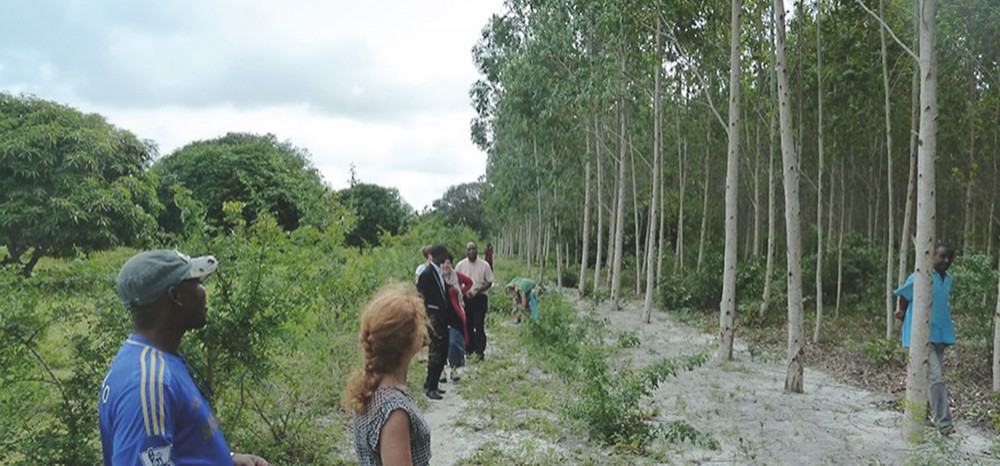
The trees – renewable resources
There are good and less good reports about the 2TF project trees: Despite the drought that has continued since March, the planting is in very good condition. The fire risks were countered with weeding the edges and removing small shrubs. Unfortunately, the sales business continues to be tough. Till now, no large quanti-ties could be sold, and somehow a brilliant idea to get the business started is still lacking. Altogether about 20,000 trees are still to be harvested and marketed.
Health Center
Also this year Zsusanna and Helmut − as mentioned above − spent their holidays performing small miracles in the Kenyan bush. And again they lived in their „second home“ as members of the village community.
Helmut’s vision for a dental health center has become more concrete this year. Many meetings with local authorities and Kilifi County Government stakeholders, especially the Department of Health Services, took place, expert opinions were obtained and new cooperations were initiated, e.g. with Pwani University (PU), which is currently building its own medical faculty. Because of the high demand and the need for sustainable service provision, it seems clear that dental care needs to be extended beyond a traditional dental station, especially for cases of emergency extractions. The plot for the Desturi Health Center was selected and has already been cleared. Once the land is officially transferred to the Desturi Foundation, the construction can start in the coming year. For the construction as such, Helmut was able to obtain a considerable subsidy from an international dentist association. But of course any financial or material support for the Desturi Health Center is very much welcome and appreciated. A significant donation of dental equipment from a supporter of Desturi based in Karlsruhe was received with great enthusiasm in the Kilifi District Hospital, where the only public dental unit in the county can be found. Special appreciation was given for this dental equipment made in Germany – which is apparently also known in Kenya for its good quality.
"Helmut’s vision for a dental health center has become more concrete this year."
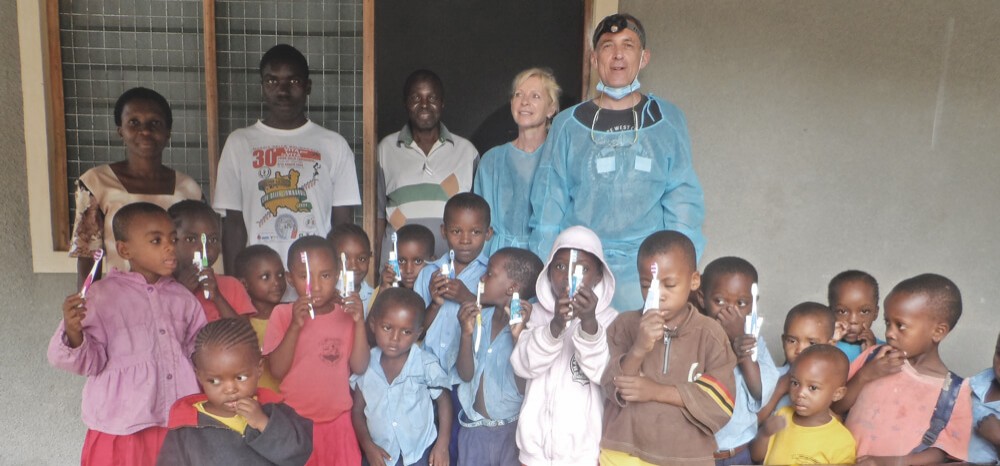
A glimpse at 2017 and the future
It is hard to believe, but the Desturi Primary School will be in its eighth year in 2017, and the first students will graduate at the end of 2017. This alone confirms that we are well-positioned to provide young people with a good level of education and, by this, to contribute to giving them a perspective for their future lives. Desturi − the path is the goal − has pursued this claim from the outset. Students being awarded the Kenya Certificate of Primary Education (KCPE) is an important milestone, but it is not the goal. There is still much to be done. A Vocational Training Center (VTC) would greatly contribute to the sustainability of the project. For many Kenyans the transition from primary to secondary school and finally to a university is difficult, most often because of financial reasons. But even for those with an academic degree, access to the labor market is not necessarily secure. An alternative path to employment could be practical vocational training, maybe in line with the German dual vocational training system. We are currently exploring the possibilities in this area: Training on the job, train the trainer and vocational training serve as conceptual inspirations for the activities which could provide an option for further education for the first Desturi graduates. It is now a question of concretizing a suitable concept, obtaining the approval from the local authorities, and, above all, the necessary funding.
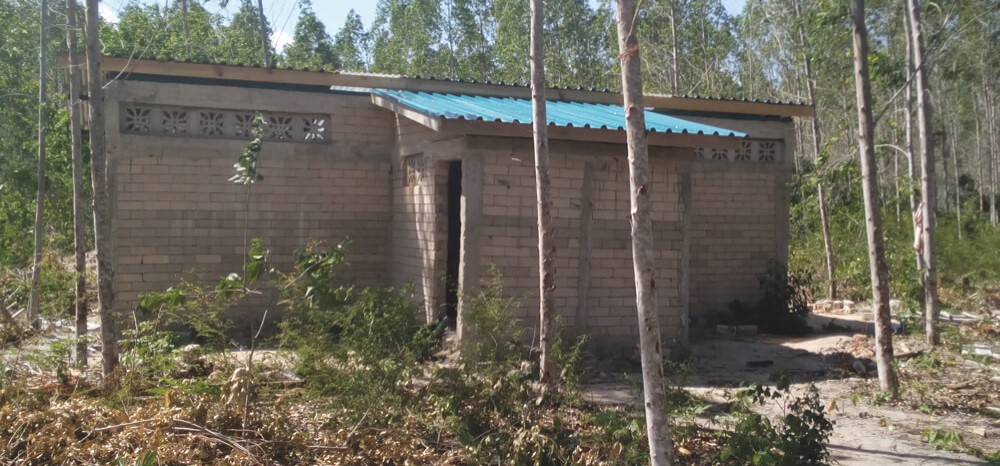
Emmanuel and family
The many successes to be reported from Kenya in 2016 were not least due to the great support of our reliable partner Emmanuel and his entire family. We are particularly pleased that Emmanuel’s wife Beatrice successfully completed her business studies in Mombasa this year.
We sincerely congratulate her on this accomplishment and wish her every success in the future. Other good news is the forth-coming move of Emmanuel and his family from Mombasa back to Malindi. This will allow Emmanuel to be closer to the village and the Desturi project in the future. Beatrice will now take care of the marketing of the trees and contribute fresh ideas in order to make progress in this subproject. The children, Faith and Prince, are doing fine and attend the school or kindergarten.
Donations
We would like to highlight the support of the Rotary Club München-Harlaching and its members in achieving the successes of the past year. Thanks to many donations from the Rotarians, it was possible that Desturi could develop so quickly. At Christmas 2015 not less than 15,000€ have been donated. But also single generous donors used special events such as special birthday celebrations and family events to collect money for Desturi – giving the project additional boost. Further, there were creative activities such as the „Schule für Schule“ (School for School) charity run organized by the Urspring School in Schelklingen.
Furthermore, Desturi is continuously supported by longtime loyal companions, by a handful of volunteers who form the basis for the further development of this project. At this point we would like to express our special gratitude for their sustained, selfless support! And we would like to extend our thanks to all the private supporters of the Desturi project who do not want to be mentioned at all.
Still, there is a need for so many things: books and other materials for students and for teachers, food and clothing, but also for medical help for poor children. Even the smaller donations and contributions count and are always very welcome; constant small drops do not evaporate, but cause many small every day wonders. Developments such as the new access to the electricity and water network, the completion of the primary school, the expansion of the sanitary facilities, the fencing of the terrain, the infrastructural development, the computer room in the Kenyan bush and, last but not least, the foundation of the rescue center make the spirit of Desturi visible. Experiencing the sense of community, creating awareness for the power, which can be jointly activated by people themselves, fostering the attachment to one’s own home and feeling the hope that this home will provide a good future make Desturi strong and alive.
May this commitment remain strong to support the further expansion of the project and to secure its long-term existence. We are also looking forward to all forms of support, no matter how small, which reach us − and the students ¬ as a Christmas donation. It goes without saying that there is always the option for a permanent commitment to our joint project, which we would like to invite and encourage. Asanteni sana!
We wish you all a merry Christmas and a happy, healthy and successful New Year!
For the Desturi team
Philip Bootz & Benedikt Schlüter
